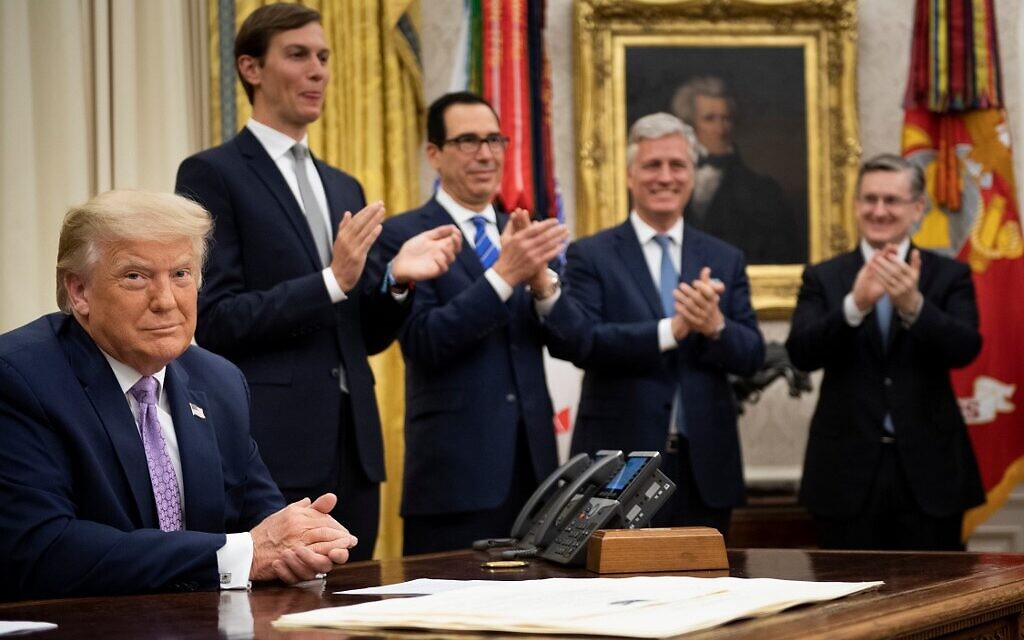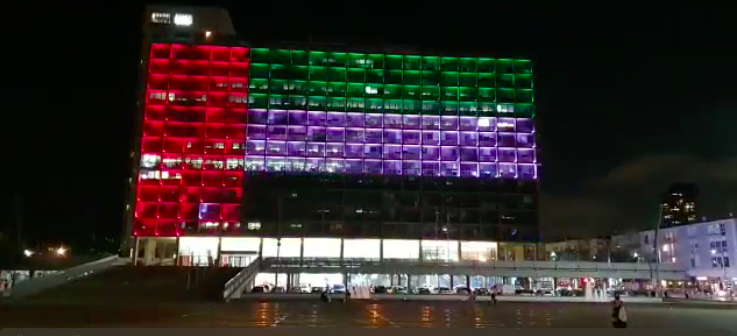Jared Kushner: The historic deal between Israel and the UAE shows Trump’s strategy is paying off
When President Trump took office, the Middle East was in a state of extreme turmoil, even by the low standards of a region long plagued by danger and violence. Islamic State terrorists controlled an area in Iraq and Syria approximately the size of Ohio. The peace process between Israel and the Arab world had stalled. Iran was spreading instability through proxy fighters in Yemen, Iraq and Syria.
It was to this region that President Trump took his first trip abroad as president. In Riyadh, Saudi Arabia, the president laid out his vision for a more peaceful, secure and prosperous Middle East. He described to the leaders of dozens of Arab and Muslim countries a region with vast potential, held hostage by extremism and the conflicts of the past.
President Trump recognized that, to tap this potential, the region required a strategic realignment. In the new Middle East, nations must chart their course based on shared interests and common values, not old hatreds and rivalries. The president also recognized that building this future would require altering a U.S. policy that for far too long had accepted these historic animosities and even nurtured them.
That’s why instead of rewarding America’s enemies, we pledged to draw our partners closer. Rather than lecturing America’s friends, we committed to taking forceful action against the evils of extremism and terror. Finally, we resolved to pursue these goals grounded in the realities of today, not the ghosts of the past.
Three-and-a-half years later, this strategic realignment continues to pay off. The Islamic State caliphate has been destroyed, its brutal leader Abu Bakr al-Baghdadi killed. Iran remains a pariah state but is more constrained than ever before. And thanks to the courageous leaders of Israel and the United Arab Emirates, the Middle East this week took a great step toward a future in which people of all faiths and ethnic backgrounds can live together in the spirit of cooperation and peace.
Ultimately, it is up to the people of the Middle East to decide the future they want for their children. The United States cannot and should not choose for them. But the remarkable progress over the past several years is clear evidence that the people of the Middle East are finally on a path to a very bright future. And today, more than ever, they can count on the United States’ support every step of the way.
Anwar Gargash: UAE minister of state for foreign affairs: The UAE's landmark deal with Israel is a step towards achieving a two-state solution
Since Israel’s inception, Arab nations have taken the position of refusing to recognise it because its establishment took place at the expense of Arab inhabitants of that land. But as the world has witnessed, this stance has yet to achieve any concrete progress or benefits for the Palestinian people. Indeed, over the years, several Arab states have realised that making peace with Israel, and ensuring that our Israeli neighbours feel secure in the region, is the best way to guarantee the rights of the Palestinian people, while also bringing benefits for the region as a whole. The UAE is now joining their number.Qanta Ahmed: Israel-UAE agreement will likely lead more Arab nations to recognize Jewish state
But this is not an entirely new step. The UAE and Israel have worked together before, most recently in the fight against Covid-19. We are a country that constantly looks towards the future. We recently launched the Arab world’s first mission to Mars. We have demonstrated an exemplary response to the ongoing pandemic. In light of this philosophy, we see peace and dialogue as the means to achieve a safer and stronger Middle East.
But this new agreement will by no means preclude our support of the Palestinian cause in line with the Arab consensus. There will be no embassy in Jerusalem until Jerusalem is also the capital of the future Palestinian state. We will continue to steadfastly defend the Palestinian right to statehood and dignity. And indeed, any and all progress on the matter must derive from direct dialogue between Palestine and Israel themselves. But this new deal will allow us to push ever harder for such an outcome.
We in the UAE are proud of this progress and look forward to the achievement of a more secure future for the Palestinian people, to the growth of our new partnership with Israel, and to the betterment of the region as a whole.
Much credit for the Israel-UAE agreement and the earlier Israeli-Palestinian peace plan goes to Jared Kushner, President Trump’s senior adviser and son-in-law. He and other U.S. officials have worked hard to establish personal friendships with Muslim leaders across the Middle East, which leads me to conclude that the agreement announced Thursday will be followed by the establishment of relations between Israel and more of its neighbors.
It is no surprise that the seven-member federation of the United Arab Emirates — now under the leadership of the crown prince of Abu Dhabi and commander in chief of the UAE’s formidable armed forces, Sheikh Mohammed Bin Zayed — has become the first Muslim nation to normalize relations with Israel since Egypt and Jordan did so. His courage and long-term vision means Israel and the UAE will now have embassies in each other’s capitals.
Muslims will be able to fly directly from the UAE to Israel to pray at the third-holiest site of Islam –- the Al Aqsa Mosque in Jerusalem.
Israelis will be able to visit, work and trade with the UAE — one of the most intensely forward-thinking regions in the world. They will be able to admire the remarkable Shaykh Bin Zayed Mosque, peruse the astonishing art the region has amassed and see the world’s preeminent Falcon hospital — a personal favorite of mine, as a physician.
Israelis and residents of the UAE will also be able to get to meet and know each other on a personal basis, establishing both friendships and professional relationships. The UAE is home to some of the most educated and empowered Muslim women in the region, including Maj. Mariam Al Mansouri the UAE’s first female fighter pilot, who led the first airstrike her country launched against ISIS. I’m sure she would get along well with Israeli military women I know.
All of us who are friends of peace between Israel and the Arab and Muslim world should now hope that Crown Prince Mohammed bin Salman of Saudi Arabia follows the path of his neighbor and ally the UAE in establishing normalized relations with Israel.
It is in the self-interest of all Muslim nations— including the 16 remaining Arab nations that continue the boycott of Israel — to at long last accept the fact that the modern state of Israel exists and is here to stay.
Crown Prince Mohammed of the UAE has long been a behind-the-scenes source of wisdom, guidance and strategic policymaking for Crown Prince Mohammed of Saudi Arabia, and both nations have worked together in an intensely difficult time.
The neighboring countries have together dealt with the rise of the ISIS terrorist group; the deepening hostilities and undeclared open conflict between Saudi Arabia and Iran; the rise of the terrorist group and Iranian proxy Hezbollah; the Syrian civil war; and the dangerous threat they face from Iran itself.
Israel can be a natural ally to Arab nations against these threats. Let’s hope and pray that the announcement by President Trump establishing ties between Israel and the UAE is followed by more such agreements with Arab and Muslim nations. That would serve America’s best interests and the best interests of all the countries following the road to peace and cooperation.
AHMED: #IsraelUAE peace deal is EPIC - here’s why @petehegseth on @foxandfriends ?cc ?@IWF? ?@aviberkow45? #ISRAELUAEPEACEDEAL pic.twitter.com/CzLM1mZPcJ
— Qanta Ahmed (@MissDiagnosis) August 15, 2020
AHMED: #UAE clearly the keystone nation in the region- deeply engaged w #israel on aid, #COVID19 , Rafael defense systems , Israel aerospace. VISIONARY ?@MohamedBinZayed? FORMIDABLE strategist & global player cc @iwf ?@aviberkow45? pic.twitter.com/WTp2VyRg4l
— Qanta Ahmed (@MissDiagnosis) August 15, 2020








 Bialystock Ghetto, August 13 - Authorities mandated this week that the Jews of this city elect delegates to a council that will represent the community in its dealings with the German occupation administration, sparking a campaign by several dozen prominent Jewish figures to serve on the council, with one ambitious man boasting that he possesses unparalleled abilities in pointless efforts to delay, soften, or otherwise thwart in some measure the inevitable genocide on the horizon.
Bialystock Ghetto, August 13 - Authorities mandated this week that the Jews of this city elect delegates to a council that will represent the community in its dealings with the German occupation administration, sparking a campaign by several dozen prominent Jewish figures to serve on the council, with one ambitious man boasting that he possesses unparalleled abilities in pointless efforts to delay, soften, or otherwise thwart in some measure the inevitable genocide on the horizon.





















